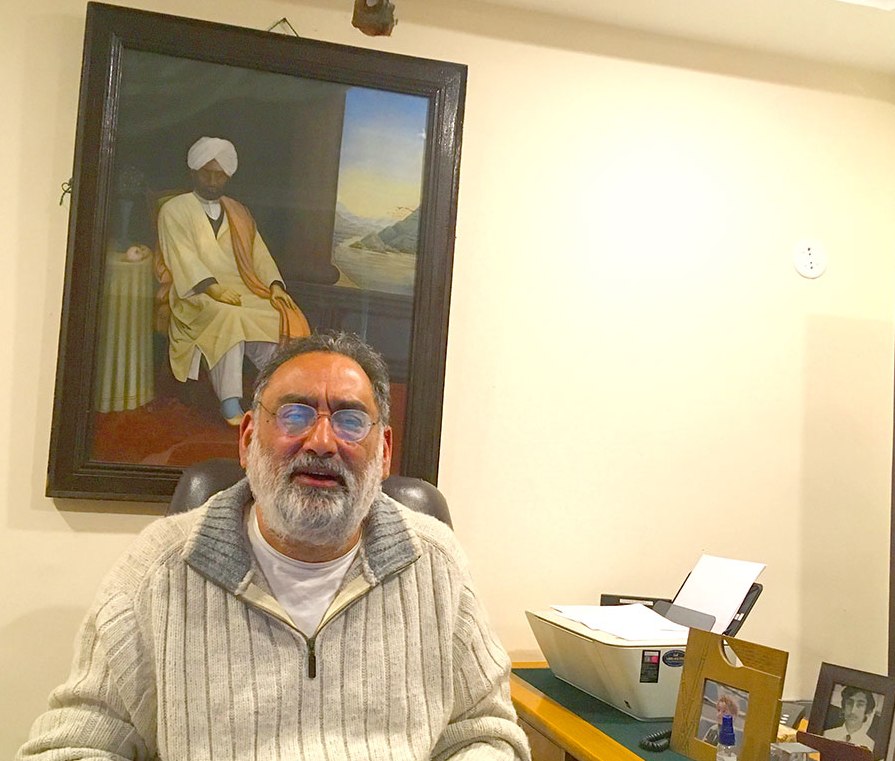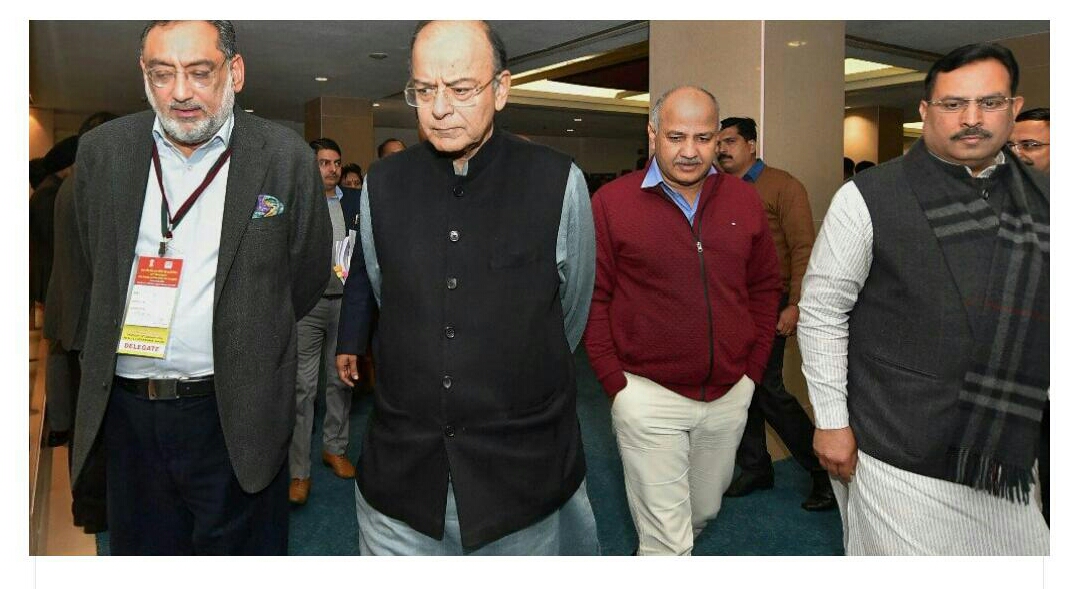Foremost economist and Jammu and Kashmir’s former finance minister Dr Haseeb A Drabu wrote a series of articles on the 35A and the different aspects of Kashmir’s constitutional history. In this interview, he explains why he felt compelled to break his silence and what abrogation of 35A means

KASHMIR LIFE (KL): Why have you all of a sudden, started responding seriously to what Finance Minister Arun Jaitley wrote about Jammu and Kashmir’s special status, especially Article 35A?
HASEEB DRABU (HD): This is the first time someone from the BJP, who understands legal niceties and constitutional nuances has articulated a reasoned position on Article 35A. He is a reasonable man who has on this matter taken an unreasonable position. Otherwise, his position on J&K has not been abrasive. Read between the lines it can be inferred that he is supporting abrogation of Article 35A. This doesn’t augur well. Hence, I seriously responded to it. Otherwise, it has by and large been chest-thumping from one side and breast-beating from the other side.
KL: You negotiated the Agenda of Alliance with BJP on behalf of the PDP, a party you have now dissociated from. Did not you take enough care about the state’s special position?
HD: Of course, I did. If you care to read the document, before the “terms of engagement”, are spelt out, there is an overarching qualifier and overriding binder on the special status of J&K. It reads, “..the present position will be maintained on all the constitutional provisions pertaining to J&K including the special status in the Constitution of India”.
To reiterate, it says, “all the constitutional provisions”. While Article 35A along with Article 370 is the core of that special position, there are other provisions too, like Article 308 and Article 152. The special position is sprinkled all over the Indian Constitution!
KL: How illegal is the inclusion of the article 35A in the constitution of India, as right-winger’s claim?
HD: How can it be illegal? It is common sense. If Article 35 A is illegal, then what you are really saying is that the Constitution of India is illegal! It casts aspersion on the Indian Constitution itself; it can’t be a legal document with illegality thrown in here and there!
Article 35-A was included into the Constitution of India in 1954 by a presidential order made under Article 370 of the Constitution of India. The process followed in getting Article 35A is as constitutional and transparent as it can get. The report of the J&K Constituent Assembly which listed out the provisions of the Constitution of India, besides Articles 1 and 370 that should be made applicable to J&K had Article 35A in it. It was on that basis that the president’s order under Article 370 was issued, which incorporated Article 35A in the Indian Constitution.
The real argument being made by them is that Article 35A could not have been introduced without being passed by the Parliament as required by Article 368 which prescribes the amending procedure.
Two of the foremost authorities have written about this issue. A G Noorani, the most authoritative voice on the constitutional relationship between India and J&K has left no scope for any ambiguity: “Article 35-A is not a mere executive order under Article 370 but is itself a constitutional provision, a compact recorded in both constitutions.” No court can ignore this.
Assuming for a moment, that it is not a provision but an amendment, Justice A S Anand, the only other authority in this matter, is also very clear that “Article 368 does not curtail the power of the President under Article 370. Article 370 is a special provision for amending the constitution in its application to the state of Jammu & Kashmir.”
Two things emerge one that President can amend the Constitution in its application to J&K without any reference to the Parliament but not without the concurrence of the state. Two, “no such amendment which is not acceptable to the Government of J&K can be applied to the state even if the procedure for amendment as laid down under Article 368 has been followed”. That settles the surreptitious slur.
KL: Jaitley says this particular article is a hindrance in the state’s economic development. Since you have handled the economic policy of the state, how correct is it?
HD: Contrary to “hampering J&K’s development”, Article 35A enabled the transformation of the economic structure itself. What prevented the J&K Big Landed Estates Abolition Act, 1950, from being annulled on the grounds of infringing the fundamental right to property under Article 19(1)(f) was Article 35A(b). It is because of those land reforms that our poverty ratio is 10%, which is less than half of the all-India level, our income inequality coefficient of 0.221 is the lowest in India; our indebtedness at 12.67, is nearly one-third of the national average. There is a near absence of landless labour; less than 2% of the work-force.
KL: Is the private sector reluctant to invest here because of Article 35A?
HD: Possible. But that is more to do with them than with the constitutional position! As far as I know, in J&K, land for industrial development is available to outsider and foreigners like elsewhere. The J&K Government offers land for the industry for a 90-year lease, renewable, in all the industrial estates. Even the State Subject Notification of 1927, which begot Article 35A, had a Class IV state subjects which included “companies in which the Government are financially interested, or as to the economic benefit to the state or to the financial stability of the Government are satisfied”.
Let me ask a question to the Government of India ‘how come the corporate sector owned by them hasn’t invested in J&K?’ There are 339 Central PSEs with investments of Rs 23 lakh crore spread all over the country. They employ 11 lakh people. What have they done in J&K? Invested all of Rs 165 crore! Just think: out of Rs 23 lakh crore…. Guess how many people do they employ? Just 21 people out of nearly 11 lakh employees.
The Government of India faces no Article 35A barriers; its security, regulatory and administrative buildings have been constructed everywhere. Look at Gulmarg. On the last count, 428,000 kanals of land are under the unauthorized usage of the central security forces. This is in addition to lakhs of kanals of land acquired, requisitioned, and leased in by the security agencies. Why then is it that in the last 70 years, there have practically been zero public corporate investments in J&K? Why should you even ask about private corporate investment? Private investments, especially foreign Investment, doesn’t come into J&K because of the UN sanctified “disputed status”, it doesn’t endorse or accept boundaries and names, and not because of special status accorded by Article 35A.
KL: Can article 35A be abrogated and what will be the costs and consequences for that?
HD: I don’t think so. But if it is done, it will be a constitutional nightmare. If Article 35A is expended, it could pave the way for rolling back of all orders extending India’s Constitution to J&K after the dissolution of the Constituent Assembly. It will take J&K back to a quasi-sovereign status, with its own Prime Minister and President. So Omar Abdullah won’t have to struggle to keep his promise!

The state subjects of J&K will cease to be citizens of India and entry of Indian nationals into J&K will be restricted. The goods from India will have to pass through a customs barrier and pay import duty. And above all the people of J&K will not be legally obliged to uphold the integrity and sovereignty of India.
KL: Kashmir’s political class is campaigning for Lok Sabha and the entire focus is on the special status. How do you see the debate going to once the elections are over. Amit Shah says this article will be history by 2020?
HD: Of course, they have to. Omar Abdullah has been fuming, Mehbooba Mufti has been fretting. Justifiably so. All the mainstream politicians accept the Constitution of India, abide by the Constitution of J&K and acknowledge the unique and special relationship between the two. This strikes at the very roots of their political existence. But the way some of them present it, it reminds me of the subaltern and rather an obscene story of the Pathan and the Pandit!
KL: Haven’t the same mainstream political class which is being very sensitive on the states special status compromised on various things involving the autonomy and the special status? What about you? You got in GST which impaired the fiscal autonomy?
HD: First on the first part of your question. Absolutely. I have always maintained that Article 370, as it is today, is nothing more than a shadow and a husk; the seed having been taken out long ago. Indeed, way back in 2012, I asked the question in a column in Greater Kashmir, “What is left of Article 370 that needs to be abrogated?” The obverse of this question is: “What are the regional parties falling over each other to defend long after the damage has been done?”
This brings me to your question of GST. It deserves a separate interview …but for now, let me say I believe that the manner and method in which we implemented GST, the process, we have reversed the clock to 1954. For the first time in 70 years, a presidential order by the Government of India was made not only on the recommendations of the cabinet but after it was approved by the Legislative assembly of J&K. Think about it. There was no need for me to go to the Assembly. A special session of the assembly was convened for this. When has it been done earlier? It has always been done on the sly. It used to be outside of the assembly. And this, when we were in alliance with BJP. It took an effort.
Let me assure than that in future, no political party can afford to get a presidential order faxed as was done for 47 orders earlier. They will have to take it to the assembly. This is a big constitutional process gain. This is how institutions get empowered.
Not only that. May I suggest you read the Presidential Order on GST. It is a written assertion on the supremacy of the Constitution of J&K. The Delhi Agreement of 1952 had made the Constitution of J&K subservient to the Constitution of India. Through this order, we have been able to restore an iota of balance. The Central Act not only explicitly acknowledges the taxation powers enjoyed by J&K under section 5 of the Constitution of J&K but also that the State Government retains the power to levy any new or additional taxes in future. More on that some other time.
The point is that all this gets lost in the breast-beating by mainstream politicians; it serves more to enrage, not to enlighten. But that is the tragedy of Kashmir politics. Their style of politics ..the style and substance of mainstream politics …does more damage than good to the cause of Kashmir.
Those people who talk of loss of fiscal autonomy don’t even know what it means. I am willing to discuss it in any forum with anyone. More damaging than financial corruption in J&K is the pervasive intellectual corruption. The combination of the two is, of course, destructive. What we need, more than anything else, is intellectual integrity and political honesty.















